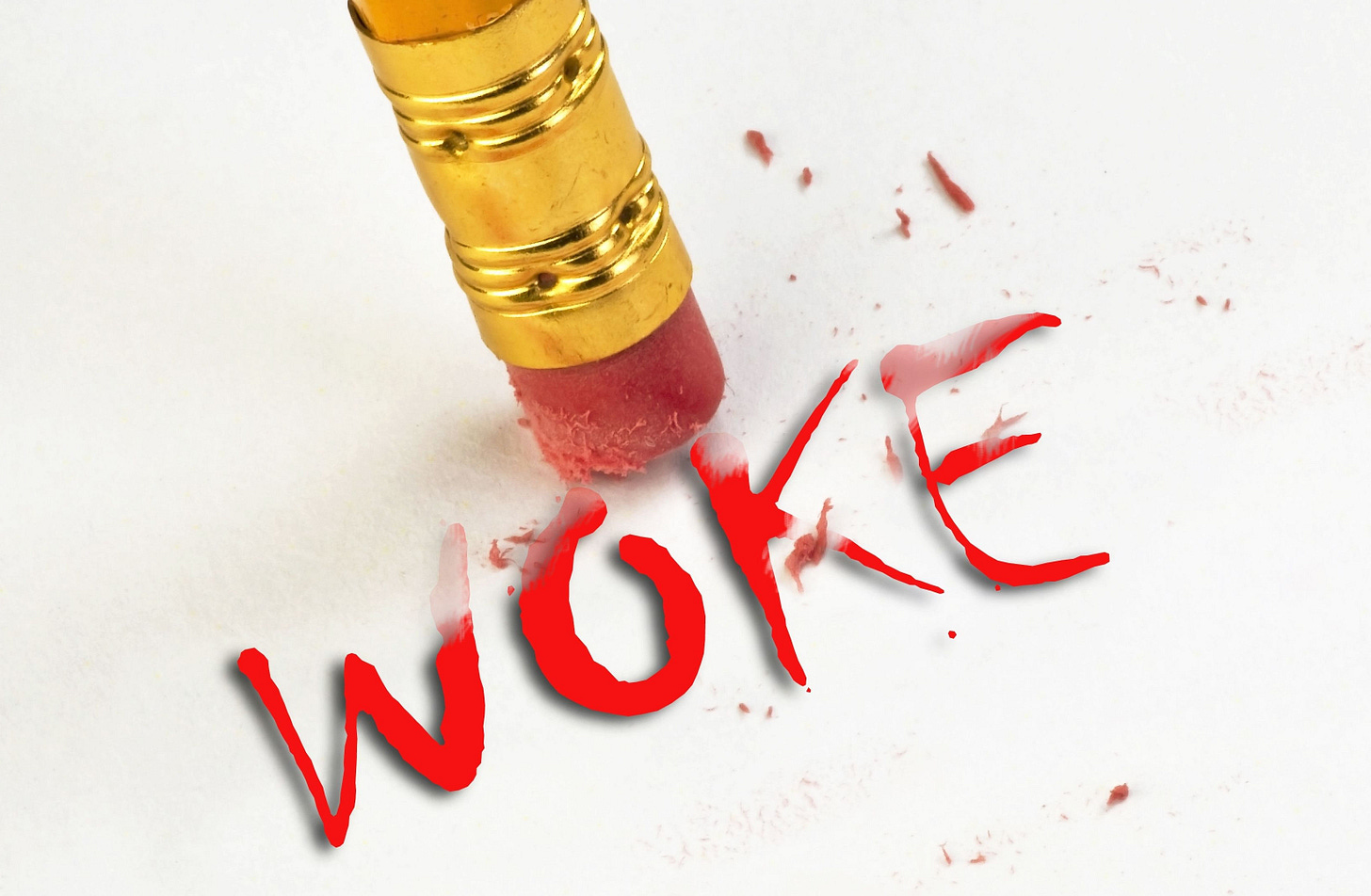E-Pluribus | March 22, 2023
Woke is broke, the hidden agenda of peer review, and the legacy of 1966.
A round-up of the latest and best writing and musings on the rise of illiberalism in the public discourse:
Noah Rothman: How We Know That ‘Woke’ Is Losing
At National Review, Noah Rothman weighs in on the “woke” feeding frenzy. Rothman links the current discourse to a familiar pattern of progressives ditching language that becomes unpopular over time while continuing to push the same policies with an updated vocabulary.
A campaign consisting of straight reporting, survey data, and contrived “viral” moments all contribute to the desired impression that those who wield the term don’t know what it means, especially if they use it as a pejorative. But even polling purporting to show that more Americans believe the term describes only positive attributes also finds that the public sees it as an epithet more than a compliment.
It’s hard to avoid the conclusion that what’s driving the campaign is that “woke” is now a political liability for those who once proudly embraced it. These periodic crusades against shorthand bubble up from the partisan depths when the Left is losing a political conflict. Rather than change their tactics, they change the language.
The Atlantic reporter Molly Ball picked up on this phenomenon a decade ago when she noticed that the Obama administration had ditched the phrase “gun control” in favor of a cavalcade of euphemisms. Anti-gun activists had begun toying with alternatives such as “gun-violence prevention,” “firearms regulation,” and, of course, “gun safety,” which edged out its competitors. Ball observed at the time that the phrase was confusing insofar as it evokes “a firearms-training course” more than any legislative initiative. It still does. But the phrase emerged as the consensus alternative to “gun control” because something had to replace “gun control.” That phrase had become toxic.
[ . . . ]
Not all these efforts to massage language have taken off. The effort to fold Hispanics into an overarching category called “BIPOC” — black, indigenous, and people of color — or to redub them “Latinx” when Hispanics began drifting into the Republican column underwent a catastrophic failure on the launchpad. Likewise, a transparent attempt to shame Republicans out of criticizing Barack Obama by taking words such as “golf,” “skinny,” “Chicago,” and “apartment” and labeling them racist “code words” never caught on. Indeed, there’s now a backlash against the phrase “code words,” which fails to convey the malignancy of people’s attempts to use “racialized terms” such as . . . “welfare.” But these efforts to change the language all spring from the same insecurities.
Read it all.
Bruce Oliver Newsome: Peer Review as Shadow Cancelling
The practice of peer review in any number of disciplines is intended to raise the scholarship bar by limiting the reach of those who cannot even satisfy others in their own field. But writing for Quillette, Bruce Newsome contends that, like many other aspects of academia, peer review has become politicized and diminished its usefulness as a result.
David Martin Jones is a political scientist, Director of Research at the Danube Institute, and Visiting Professor of War Studies at London. Although he still publishes peer-reviewed books, he tells me that he has given up submitting to journals given their increasing bias.
Around 2010, Jones tells me, a new editor at Review of International Studies, in which he had previously published, “sent me a dismissive note to say the journal was not interested in articles with our viewpoint [on counterinsurgency] and wouldn’t even send it out to reviewers.” Around the same time, the Australian Journal of International Affairs redacted a co-authored essay, for “self-plagiarism” of an article in the Journal of Cold War Studies, and banned the two authors for seven years. However, Jones observed the same journal publishing articles that “have appeared as book chapters in edited books or reports or been abstracted from a monograph. … We were clearly selected for special treatment because we took a sceptical view of the Australian Labour Party’s premier [1972–5] Edward Gough Whitlam.”
M.L.R. Smith is another of Jones’s co-authors. “David and I joked that we were cancelled before it became fashionable to be cancelled” he tells me, “because we regularly submitted work that ran counter to the usual orthodoxies that pervaded academia. … Twenty years [ago] … David and I, along with another academic from the University of New South Wales, submitted an essay to Statecraft & Diplomacy. During the review process, one of the reviewers wrote to the academic at UNSW—who was the most junior amongst us—to tell him that he would be damaging his reputation if he proceeded with the submission, and advised him to withdraw his name from the article. … I wrote a letter of complaint to the editor exposing this, but (a) never received any response, (b) never received any review.”
Smith is careful to point out that many journals reject his submissions but show fairness, transparency, and timeliness. However, such journals are not the rule. “Getting rejected,” he tells me, “and taking the rough with the smooth, is part and parcel of academic life. That said, ever since I began submitting articles to journals three decades ago, I have got used to being on the receiving end of inept, partisan, cavilling, and unconstructive reviews, or weak and unresponsive editors. Literally, they are too numerous to mention or to recall. What I might add is that poor reviewing and unprofessional practice in my experience tend to constitute the norm rather than the exception. In particular, one might single out the abuse of the process of anonymous reviewing where reviewers can say more or less anything without any form of accountability. … I would add that what contributes to the problems identified are: (a) often longstanding editors who run their publications like little fiefdoms, and (b) poor oversight from journal publishers.”
Read it all here.
John McWhorter: Today’s Woke Excesses Were Born in the ’60s
In the minds of many, the 1960s were the best of times and the worst of times on a number of societal and cultural fronts in America. In his latest New York Times newsletter, John McWhorter, surveying a number of books on the civil rights movement, suggests that the roots of today’s progressive overreach lie in that tumultuous decade.
[1966] was a year when the fight for Black equality shifted sharply in mood, ushering in an era in which rhetoric overtook actual game plans for action. It planted the seed for the excesses of today’s wokeness. I wouldn’t have been on board, and I’m glad I was only a baby that year and didn’t have to face it as a mature person.
The difference between Black America in 1960 and in 1970 appears vaster to me than it was between the start and end of any other decade since the 1860s, after Emancipation. And in 1966 specifically, Stokely Carmichael made his iconic speech about a separatist Black Power, the Student Nonviolent Coordinating Committee he led expelled its white members (though Carmichael himself did not advocate this), the Black Panther Party was born, “Black” replaced “Negro” as the preferred term, the Afro went mainstream, and Malcolm X’s “The Autobiography of Malcolm X” (written with Alex Haley) became a standard text for Black readers.
I doubt most people living through that year thought of it as a particularly unique 365 days, but Mark Whitaker, a former editor of Newsweek, has justified my sense of that year as seminal with his new book, “Saying It Loud: 1966 — the Year Black Power Challenged the Civil Rights Movement.” Whitaker has a journalist’s understanding of the difference between merely documenting the facts and using them to tell a story, and his sober yet crisp prose pulls the reader along with nary a lull.
Read the whole thing.
Around Twitter
FIRE gets results at Delaware State University:
A thread based on an essay by Persuasion’s Seth Moskowitz who argues that the (New York) Times, they are a-changing:










